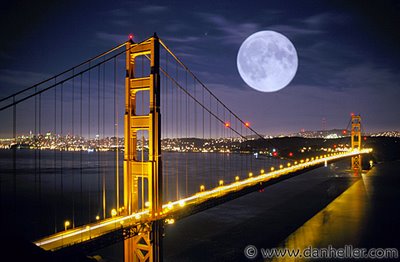"May we give all sentient beings safe passage through our minds." - Scott Adams (redo)
Followers
Saturday, May 27, 2006
Beginners mind doesn't know what force is;
Beginners mind doesn't know what beauty is;
Beginners mind doesn't know what it is to understand;
Beginners mind doesn't know what certainty is;
Beginners mind doesn't know about making a judgement;
Beginners mind doesn't know about violence;
Beginners mind doesn't know there are opinions;
Beginners mind doesn't know you are there;
Beginners mind doesn't know about suffering;
Beginners mind doesn't know about pride;
Beginners mind doesn't know what illusions are;
Beginners mind doesn't know what's important;
Beginners mind doesn't know what knowing is;
by Gary Merrill
Friday, May 26, 2006
WEIGHTS & MEASURES
we would stand in awe of the firefly as we do before the sun.
~Kahlil Gibran.
Boundless
lifting feathers round
the sparrow's neck,
lifting leaves in a wave
across the bean field,
I find no place
where I can say,
here my being ends.
By Colin Oliver (1946 - )
Liberation . . .
~Ramesh Balsekar
Experiencing U nion
a rope let down in my well. I've climbed out to
stand here in the sun. One moment I was at the
bottom of a dank, fearful narrowness, and the
next, I am not contained by the universe. If every
tip of every hair on me could speak, I still couldn't
say my gratitude. In the middle of these streets
and gardens, I stand and say and say again, and
it's all I say, I wish everyone could know what
I know.
'The Essential Rumi'
Coleman Barks/John Moyne
Thursday, May 25, 2006
What the Living Do
some utensil probably fell down there.
And the Drano won't work but smells dangerous,
and the crusty dishes have piled up
This is the everyday we spoke of.
It's winter again: the sky's a deep headstrong blue,
and the sunlight pours through
and I can't turn it off.
For weeks now, driving,
or dropping a bag of groceries in the street the bag breaking,
And yesterday, hurrying along those
wobbly bricks in the Cambridge sidewalk,
spilling my coffee down my wrist and sleeve,
This is it.
Parking. Slamming the car door shut in the cold.
What you called that yearning.
We wantwhoever to call or not call,
a letter, a kiss -- we want more and more and then more of it.
when I catch a glimpse of myself in the window glass,
say, the window of the corner video store,
and I'm gripped by a cherishing so deep
and unbuttoned coat that I'm speechless:
I am living, I remember you.
Wednesday, May 24, 2006
"Tibetan Buddhism From the Ground Up"
into a cloudless sky, and blowing soap bubbles through a
plastic ring. As a bubble drifts up into the sky, you watch
it rise, and this brings your attention to the sky. While
you are looking at the bubble, it pops, and you keep
your attention right where the bubble had been. Your
awareness now lies in empty space.
-B. Alan Wallace,
Tuesday, May 23, 2006
Nature As A Minded Entity
designed to suppress, distort, and ignore: that Nature is
a minded entity; that Nature is not simply the random
flight of atoms through electromagnetic fields; that Nature
is not the empty, despiritualized lumpen matter that we
inherit from modern physics. But it is instead a kind of
intelligence, a kind of mind."
—Terence McKenna, http://www.deoxy.org/mckenna
I have learned to love you late,
I have learned to love you late!
You were within me,
and I was in the world outside myself.
~Augustine
Everything and Nothing in One Breath
Consciousness is not an object, so you cannot say it is something. And yet it is not nothing. Nothing is void; it has no attributes, no qualities. Consciousness is empty of any thing, and yet there is something endlessly compelling in that emptiness. When you contemplate consciousness, you discover a mysterious sense of knowing that is both knowing nothing and knowing everything at once. Whatever you are becoming cognizant of, its nature seems to be everything—fullness, completeness. The emptiness is full. That's why the emptiness is compelling, because it is full of the knowing of some mysterious everything that is not a thing. It's everything; it's nothing—you can go on forever: everything, nothing, nothing, everything, always meaning the same thing. If you could say everything and nothing in one breath, perhaps you could capture the paradoxical nature of consciousness.
Andrew Cohen |
Advaita
Forgotten greed and all ambitions snare:
When you have banished all intruding thought
And scotched the Ego lurking in its lair;
When you have come to nothing and seek nought
But less than nothing - in your earthly quest,
You will be ALL at last - and more than nothing,
For nothing will be more than all the rest.
~Robert Goslin
Sunday, May 21, 2006
Hokusai says Look carefully.
He says keep looking, stay curious.
He says there is no end to seeing.
He says Look Forward to getting old.
He says keep changing,
you just get more who you really are.
He says get stuck, accept it, repeat yourself
as long as it's interesting.
He says keep doing what you love.
He says keep praying.
He says every one of us is a child,
every one of us is ancient,
every one of us has a body.
He says every one of us is frightened.
He says every one of us has to find a way
to live with fear.
He says everything is alive -
shells, buildings, people, fish,
mountains, trees. Wood is alive.
Water is alive.
Everything has its own life.
Everything lives inside us.
He says live with the world inside you.
He says it doesn't matter if you draw,
or write books. It doesn't matter
if you saw wood, or catch fish.
It doesn't matter if you sit at home
and stare at the ants on your verandah
or the shadows of the trees
and grasses in your garden.
It matters that you care.
It matters that you feel.
It matters that you notice.
It matters that life lives through you.
Contentment is life living through you.
Joy is life living through you.
Satisfaction and strength
are life living through you.
Peace is life living through you.
He says don't be afraid.
Don't be afraid.
Look, feel, let life take you by the hand.
Let life live through you.
Hokusai Says
~ by Roger Keyes
A Gradual Awakening
There is little you can do about what arises in the mind.
What arises is karmically conditioned by what has gone
before. There is nothing that need be done about any
object as it arises. There is only something we can do
about how we respond to that object. How we respond
creates the next moment, and conditions how that same
object will be related to in the future.
The sooner we notice the arising of moods and thoughts
and realize they are Just karmic fruits of the past, the
easier they can be let go. There's no need to reinforce
these states by reaction, to become as Trungpa Rinpoche
says, "negative in the negative." When negative, unwhole-
some states arise, don't hit at them with a hammer. Don't
get angry at yourself for being angry which only creates
more karma. We can learn to respond in a skillful manner
that allows compassionate recognition of our conditioning
to pull us out again and again. Then we can begin to under-
stand why we will find ourselves angry, jealous, selfish,
greedy so many more times. And how many more times we
are going to find ourselves without such unwholesome
tendencies, and think "Ah, I'm done with them at last."
And how that greed for being "done with them at last"
will create the next state of mind. How letting go of it
all is really the only way.
~Steven Levine
Thursday, May 18, 2006
Birthday Wish
who are looking to find that which is
eternal, without beginning and end,
will walk together with greater intensity
will be a danger to everything which is
unessential, to unrealities, to shadows.
They will concentrate,
they will become the flame,
because they understand.
~Jiddhu Krishnamurti
The Three Greats For A Birth Anniversary
thinking about it, this awareness soon continues to function
even when there are thoughts floating through the mind
just as clouds floating through the sky leave no change in
the space.
No action or process, the basis of which is duration, could
possibly bring about a suspension in its own temporal
functioning. Awakening is an instantaneous break in the
succession of duration which can only come about through
an intuitive apprehension of immediate timelessness.
~Ramesh S. Balsekar
Secret of secrets
of yourself just once,
The secret of secrets
Would open to you.
The face of the unknown,
Hidden beyond the universe
Would appear on the
Mirror of your perception.
~Rumi
I Am This
What else can I be? I am neither rich nor poor,
I am myself."
~Sri Nisargadatta Maharaj
Tuesday, May 16, 2006
Those who desire to understand,
without beginning and end,
will walk together with greater intensity
will be a danger to everything which is unessential,
to unrealities, to shadows.
They will concentrate,
they will become the flame,
because they understand.
~Jiddhu Krishnamurti
Thursday, May 11, 2006
Wednesday, May 10, 2006
Adi Atman #9 you you

Adi Atman,
I am a fool
I place a picture
before me
and say
-- you you
hosanna hari hari bol!
daybreak and I whisper
to the sun
-- you
full moon night
and I cry out
-- you
summer downpour
the thunder crash
shouts for me
-- YOU
drowning
drunk from too much
seawater
I sputter
-- you you you
shambo shankara!
I am a grasping fool
I say -- you --
and you are gone
when I remember to shut up
then you are here
and I am gone
~Ivan M. Granger
How Would You Live Then?

blew in circles around your head? What if
the mockingbird came into the house with you and
became your advisor? What if
the bees filled your walls with honey and all
you needed to do was ask them and they would fill
the bowl? What if the brook slid downhill just
past your bedroom window so you could listen
to its slow prayers as you fell asleep? What if
the stars began to shout their names, or to run
this way and that way above the clouds? What if
you painted a picture of a tree, and the leaves
began to rustle, and a bird cheerful sang
from its painted branches? What if you suddenly saw
that the silver of water was brighter than the silver
of money? What if you finally saw
that the sunflowers, turning toward the sun all day
and every day -- who knows how, but they do it -- were
more precious, more meaningful than gold?
Monday, May 08, 2006
A Cosmic Orientation
When enlightenment is seen in an evolutionary context, the challenge for the individual is tremendous. You recognize that your own liberation is no longer the goal of the spiritual path, but merely the starting point from which you must boldly endeavor to take responsibility for the evolution of consciousness itself.
It is truly an awe-inspiring task, but I believe it is possible for anyone who is deadly serious to do this. The willingness is all it takes, but it must be nothing less than a heroic willingness—a willingness that is unconditional. You have to realize the dramatic scale at which this process is operating. When you awaken to the fact that the spiritual impulse is moving at a species level, you will begin to see your own choices, including your relationship to your own mind and emotions, to time, and ultimately to life itself, on a literally cosmic scale. You will see your own presence here on earth in relationship to the evolution of the cosmos itself, at the level of consciousness.
If your orientation is not that big, you are always going to fall short. Our habitual ways of thinking are just too small-minded, petty, and painfully personal, and that is why we keep slipping back into an unenlightened perspective and wondering why we aren't making any progress. It's simply because of where our attention is. So in order for authentic, profound, and meaningful transformation to occur, we have to make the effort to see all of our choices in light of this literally cosmic context. And that is evolution. That's what our next step is: awakening to a cosmic orientation in relationship to being a human being, here on earth, right now.
Andrew Cohen
Allow Life to Live

"False imagination teaches that such things as light and shade, long and short, black and white are different and are to be discriminated; but they are not independent of each other; they are only different aspects of the same thing, they are terms of relation, not of reality. Conditions of existence are not of a mutually exclusive character; in essence things are not two but one. Even Nirvana and Samsara's world of life and death are aspects of the same thing, for there is no Nirvana except where is Samsara, and no Samsara except where is Nirvana. All duality is falsely imagined." (from: Lankavatara Sutra ~ trans D.T. Suzuki) In terms of practical psychology this means that there is no actual distinction between our ordinary, everyday experience and the experience of Nirvana or spiritual freedom. But for some people this experience is binding and for others liberating, and the problem is to achieve what the Lankavatara calls that "turning about in the deepest seat of consciousness" which effects the transformation. For what is our ordinary, everyday experience? It is not just our awareness of external circumstances or even such ordinary activities as walking, eating, sleeping, breathing, and speaking; it includes also our thinking and feeling: our ideas, moods, desires, passions, and fears. In its most concrete form ordinary, everyday experience is just how you feel at this moment. In a certain sense Buddhism is very much a philosophy and a psychology of the moment, for if we are asked what life is, and if our answer is to be a practical demonstration and not a theory, we can do no better than point to the moment Now! It is in the moment that we find reality and freedom, for acceptance of life is acceptance of the present moment now and at all times. Acceptance of the moment is allowing the moment to live, which, indeed, is another way of saying that it is to allow life to live, to be what it is now (yathabhutam). Thus to allow this moment of experience and all that it contains freedom to be as it is, to come in its own time and to go in its own time, this is to allow the moment, which is what we are now, to set us free; it is to realize that life, as expressed in the moment, has always been setting us free from the very beginning, whereas we have chosen to ignore it and tried to achieve that freedom by ourselves. ~ from: The Meaning of Happiness ~ Alan W. Watts
Awareness

"The point of practice is to
stop being the person who
has problems, and instead
to abide fully in the nature
of mind (Rigpa or Awareness)
where there are neither
problems nor a separate
individual to struggle
with them."
Rinpoche.
"Healing With Form, Energy and Light."
Edited by Mark Dahlby. Ithaca: Snow
Lion Publications, 2002.
Sunday, May 07, 2006
"Be empty of all mental content,
the very absence of obstacles will
cause reality to rush in."
Sri Nisargadatta Maharaj
IDENTITY

"How does one seek union with God?" "The harder you seek, the more distance you create between Him and you." "So what does one do about the distance?" "Understand that it isn't there." "Does that mean that God and I are one?" "Not one. Not two." "How is that possible?" "The sun and its light, the ocean and the wave, the singer and his song ... not one. Not two." ~ Anthony de Mello, SJ
"Q: Is there a simple way to undo the ego? "
become apparent that the underpinning of the ego's
responses is the pleasure that is derived from them.
There is an inner satisfaction that is the payoff
of self-pity, anger, rage, hate, pride, guilt, fear, etc.
This inner pleasure, as morbid as it may sound,
energizes and propagates all these emotions. To
undo their influence, it is merely necessary to be
willing to forego and surrender these questionable,
inner secret pleasures to God and look only to God
for joy, pleasure, and happiness.
"Although the mind will at first deny that it gets
secret pleasure from suffering, it will reveal upon
rigorous self-examination that the reason it clings
to its content is for the 'juice' it gets out of its
positionalities. With even a little self-honesty, this
is a rather easy fact to discover.
"Everyone gets a secret pleasure from resentments,
from being the martyr or the victim, and from feeling
misunderstood, unappreciated, etc. Society and the
law even reinforce these benefits with legal and
monetary rewards so that one can be compensated
for 'having their feelings hurt', for being 'slighted'
on the job, for enduring 'stress', for 'feeling
uncomfortable', etc.
"When the payoff is no longer valued, these feelings
disappear. They persist only so long as they serve a
purpose. When this 'ego juice' is abandoned, it is
replaced with inner peace.
"One will also notice that there is a secret vanity
associated with this ego game. It is as if the ego
is reinforced by proclaiming how much it suffers and
how it is such a pitiful victim of injustice and unfairness.
Actually, the ego secretly celebrates travail through
this secret self-dramatization and its personal and
social payoffs. The ego feeds itself and becomes
self-propagating to its inner dialogue.
"To undo the ego, one must be willing to abandon
this payoff game, with its grandstanding of emotions
and repetitive rehashing of data and stories to justify
its positions. One will note that the ego milks every
wrong and that it has no greater pleasure than to
indulge in 'righteous indignation.' It just 'loves' that
juicy positionality which has such a great payoff.
"A secondary gain to the ego from taking the position
of the injured party is that it now has justification for
any actions, no matter how extreme. The ego is sly.
It thrives on pain and suffering and all negative emotions.
However, one consequence it pays for all this inner,
nonintegrous secret gain is an overall sense of guilt, shame,
and low self-esteem.
"Note the tenacity with which people routinely refuse
to take positive action. They 'stubbornly' resist all
efforts to help them, even though such help is free
of charge and widely available. The most common
defense is lame excuses. When the problem is severe,
that resistance focuses the family or society to intervene
with 'tough love' confrontations.
"The ego's addiction and survival are based on the secret
pleasure of negativity, which cannot be abandoned until
it is first recognized, identified, and owned without shame
or guilt. One has to see that that is just how the ego--which
everyone inherits--operates, and recognize that it is not
really personal at all.
"Q: Why would such motivations become so tenacious?
"A: It is because it is a distorted substitute for real love
and a substitute for God. When viewed for what it really
is, this self-reward system is actually a narcissistic,
circular self-lovingness; however, it is nonintegrous
because it precludes taking the responsibility of admitting
the authorship. Even though the ego is not 'me', it
nevertheless belongs to one.
"This ego game, as played out in society, depends
on an arbitrary, movable dividing line that separates
all relationships into perpetrator and victim. Actually,
this game originates on the playground of childhood
but becomes current by popularization and media
amplification, along with the desire for financial gain.
"Q: The examples make the point clear.
"A: They are purposely detailed simply to reveal the
mechanism that is self-defeating in the end. Although
the ego gets a temporary inflation, it loses integrity
and therefore power. It is playing the game from
weakness. The confrontational 'look what you did to me'
game is supposed to reestablish self-esteem but fails
to do so for it is subverted by the 'get even' motive.
From a higher perspective, the whole game is merely
a 'So what?'
"Q: Why are these self-defeating behaviors so persistent?
"A: The ego responds with anger if its secret sources of
self-feeding are exposed. It can even react with rage
or homicidal fury toward any threat to its dominion.
It has thrived on a secret substitute for God and survived
by short-circuiting love. The ego is therefore unwilling to
give up its surreptitious feeding on itself, as forlorn as
that may sound. Although the ego outwardly protests
suffering, inwardly, it gladly welcomes it.
"Q: This is the sacrifice that one must make in order to
realize the Self?
"A: To the ego, abandoning the self-reward dynamism
is looked upon as a loss. The ego does not trust God
and thereby thinks it has only itself to turn to for
sustenance, survival and pleasure. The ego has faith
in its own mechanisms and not in God. It should not
be faulted for this error because it has no experiential
basis for comparison. Its only way out is by faith that
there is a better way. It hears a spiritual truth and
begins to search for it when the mind becomes
disillusioned with its own fallacies and failure to achieve
happiness. It finally realizes that the grim satisfaction
it squeezes out of pain is a poor substitute for joy.
"Q: Then occurs what is called the ripeness for spiritual
interest?
"A: In the due course of life's events, this becomes the
turning point. Even though it may take many lifetimes,
this represents both the 'hitting bottom' of despair and
defeat, and the inner light that leads one out of
hopelessness. Once that point is reached, the ego's days
are numbered.
"Q: What sacrifice is required?
"A: The major step is the realization that there is a
source of joy and happiness which is outside and beyond
the ego. Then arise curiosity and an interest in how to
reach spiritual goals. Belief arises which is then bolstered
by faith and eventually by experience. Next follows the
acquisition of instruction, information, and the practice
of what has been learned. By invitation, the spiritual
energy increases, followed by dedication and the
willingness to surrender all obstacles. Even the decision
to turn one's life over to God brings joy and gives life a
whole new meaning. It becomes uplifting, and the greater
context gives life more significance and reward. One
eventually becomes unwilling to support negativity,
within or without. This is not because it is wrong but
merely futile.
"Although the journey to God begins with failure and
doubt, it progresses into certainty.
"The way is really quite simple."
This text was quoted from . . .
"I: Reality and Subjectivity"
by Dr. David Hawkins
(p. 310)
cited on www.besubtle.blogspot.com
Saturday, May 06, 2006
From "The Smiling Forehead"
Bowl of Saki, by Hazrat Inayat Khan
Commentary by Pir-o-Murshid Inayat Khan
More Here . . .
The Purposeless Life

That this entire phenomenal show of the universe has no purpose indicates the obvious futility of seeking a goal in life. No sooner is a goal conceived than spontaneity is at once destroyed and the self conscious ego takes over in destructive competition against everything that comes, thus missing all that is worthwhile in life. It is, indeed, the "purposeful" life which entirely misses out on the purpose of life! The true purposeless vision misses nothing and enjoys everything without inhibition.
~ Ramesh S. Balsekar
Thursday, May 04, 2006
Awakening
Yes
Then wash your bowl.
ts
(Taken From ....... A monk approached Joshu and said, "I have just entered the monastery. Please teach me." Joshu asked, "Have you eaten your rice porridge? The monk replied, "I have eaten." "Then you had better wash your bowl," Joshu said. At that moment the monk was enlightened. -The Gateless Barrier)
These roses under my window
better ones; they are for what they are;
they exist with God to-day. There is no
time to them. There is simply the rose;
it is perfect in every moment of its existence.
Before a leaf-bud has burst, its whole
life acts; in the full-blown flower there
is no more; in the leafless root there is no
less. Its nature is satisfied, and it satisfies
nature, in all moments alike. But man
postpones or remembers; he does not live
in the present, but with reverted eye laments
the past, or, heedless of the riches that
surround him, stands on tiptoe to foresee
the future. He cannot be happy and strong
until he too lives with nature in the present,
above time.
~R.W.Emerson
Autobiography in Five Chapters

Chapter I
I walk down the street.
There is a deep hole in the sidewalk.
I fall in.
I am lost...
I am helpless.
It isn't my fault.
It takes forever to find a way out.
Chapter II
I walk down the same street.
There is a deep hole in the sidewalk.
I pretend I don't see it.
I fall in again.
I can't believe I'm in the same place, but it isn't my fault.
It still takes a long time to get out.
Chapter III
I walk down the same street.
There is a deep hole in the sidewalk.
I see it is there.
I still fall in...it's a habit.
My eyes are open.
I know where I am.
It is my fault.
I get out immediately.
Chapter IV
I walk down the same street.
There is a deep hole in the sidewalk.
I walk around it.
Chapter V
I walk down another street.
~ By Portia Nelson
The god of dirt
so many wise and delectable things, I lay
on the grass listening
to his dog voice,
crow voice,
frog voice; now,
he said, and now,
